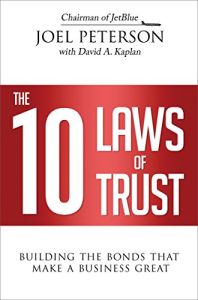Join getAbstract to access the summary!

Join getAbstract to access the summary!
Joel Peterson
The 10 Laws of Trust
Building the Bonds That Make a Business Great
AMACOM, 2016
What's inside?
JetBlue chairman Joel Peterson details his 10 laws of trust, the prerequisite for progress.
Recommendation
In an interdependent world, progress requires trust. If you can’t trust others, you cannot work toward shared goals. This is true for families, couples, team members and the nations of the world. JetBlue chairman Joel Peterson, writing with David A. Kaplan, details “10 laws of trust.” He explains what trust means, how to promote it inside organizations and how to restore trust when it’s damaged. Peterson addresses the “Valentine’s Day Massacre” of interrupted service that JetBlue suffered in 2007 – and how the company healed the resulting breach of trust with its customers – but he doesn’t explore any more recent difficulties that the airline has experienced. Nonetheless, getAbstract recommends his concise, readable, ethical guide to all who must trust others or earn trust. And that’s everybody.
Summary
About the Author
Joel Peterson, chairman of JetBlue, is a consulting professor at the Stanford Graduate School of Business. New York Times best-selling author David A. Kaplan teaches journalism and law at New York University.


















Comment on this summary